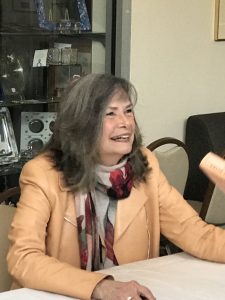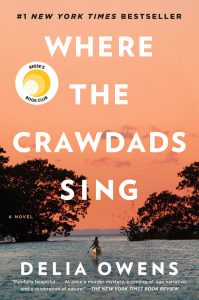SHEDDING LIGHT ON WHERE THE CRAWDADS SING

What exactly is Delia Owens saying in her best-selling novel Where the Crawdads Sing? Perplexing events and characters in the story have caused readers to ask a lot of questions and have a lot of interpretations. Last November, I was fortunate to hear Owens speak in person about the novel, offering a few answers to all those questions.
Inspiration for the story, she explained, started when she was a child in the state of Georgia and her mother would send her out to explore the woods. As an adult, while she was exploring the much larger wilds of Africa, she realized how similar human behavior is to animal behavior. “We are both territorial,” she said. “Also, females will abandon their young in times of severe stress.”
But somewhere along the way, she went on to say, mankind added virtue to the equation. “We’ve done better, but every day we have to balance these ancient aggressive genes with our virtue.”
One of the strongest characteristics linking people and animals is their need for a tribe to support and protect them. Animals won’t allow an animal that’s different to join their tribe, and people often behave the same way. “I learned this in Africa and in a sorority,” Owens said with a smile. She also pointed out that when we discriminate, everybody loses, not just the person discriminated against.
One of the major issues Owens raises in Crawdads is what happens when a person (or an animal) loses her tribe. Kya, the protagonist in the novel, loses her tribe when her family abandons her at a very young age. When she turns to the neighboring fishing-village people for help, most of them ignore her, a response Owens said reminded her of ancient primate groups. Left alone, Kya learns to survive from nature. One of the survival techniques she learns is deception, especially as practiced by fireflies. “Nature has made an art form of deception,” Owens said. She also explained that “where the crawdads sing” is the place where wild animals behave as they always have.
In a tribute to nature, Owens wrote the marsh where Kya lives as a character. “We don’t treat Mother Nature like a mother,” she said. She didn’t want to write a book about conservation, but she couldn’t help letting some of her concern about the earth slip in.
Eventually, Kya learns to tackle anything except loneliness, and loneliness has a tragic effect on her. “I didn’t know how the story would end at first, and when I came up with that ending, I made the rest of the book lead to that,” Owens said. Clues to solving the mystery are hidden throughout the story, she added.

In a natural progression from her explorations of jungles and animals, Owens moved on in Crawdads to explore the raw core of human nature. One of the main themes of the novel is discovering “the strength to find your way from the darkness back into the light,” she said. It’s about “finding how strong you are inside.” But most of all, she hopes readers of Crawdads remember “how much we need our troops. We can be very strong on our own, but more than anything, we need family and friends.”
Sally Whitney
Sally Whitney is the author of When Enemies Offend Thee and Surface and Shadow, available now from Pen-L Publishing, Amazon.com, and Barnesandnoble.com. When Enemies Offend Thee follows a sexual-assault victim who vows to get even on her own when her lack of evidence prevents police from charging the man who attacked her. Surface and Shadow is the story of a woman who risks her marriage and her husband’s career to find out what really happened in a wealthy man’s suspicious death.
Sally’s short stories have appeared in magazines and anthologies, including Best Short Stories from The Saturday Evening Post Great American Fiction Contest 2017, Main Street Rag, Kansas City Voices, Uncertain Promise, Voices from the Porch, New Lines from the Old Line State: An Anthology of Maryland Writers and Grow Old Along With Me—The Best Is Yet to Be, among others. The audio version of Grow Old Along With Me was a Grammy Award finalist in the Spoken Word or Nonmusical Album category. Sally’s stories have also been recognized as a finalist in The Ledge Fiction Competition and semi-finalists in the Syndicated Fiction Project and the Salem College National Literary Awards competition.
- Web |
- More Posts(67)